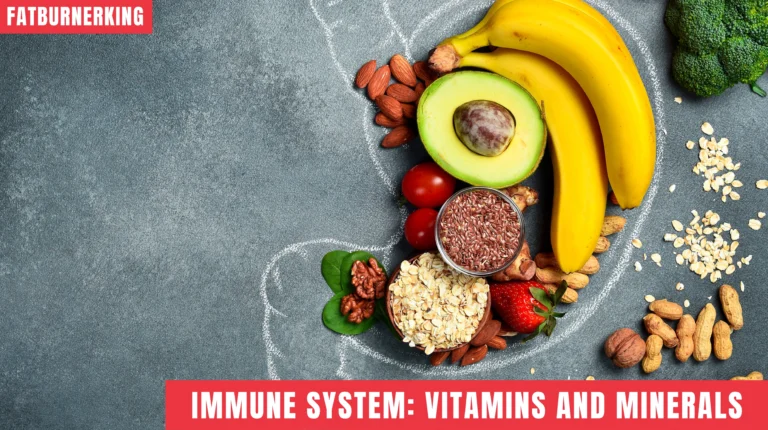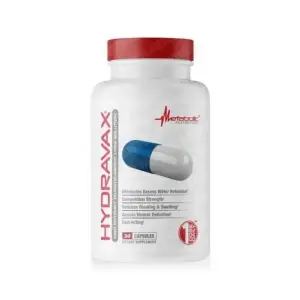
Strengthening the immune system: The role of vitamins and minerals
In a world full of pathogens and stress factors, a strong immune system is our most important line of defense. The immune system consists of a complex

Share with:

Losing weight with green tea - what you need to know
Green tea can be more than just a soothing source of warmth on cold days. It has been prized for its health benefits for centuries, and recent studies suggest that it can be particularly helpful for weight loss. The antioxidants it contains, such as catechins, play a key role in this and make green tea a natural weight loss aid.
While many people rely on coffee for an energy boost, green tea offers a mild alternative with less caffeine that still promotes concentration and boosts the metabolism. Matcha in particular, a special form of green tea, has gained popularity due to its higher content of nutrients and antioxidants. These properties not only promote fat burning, but also reduce cravings and thus help to successfully maintain a diet.
Green tea has long been known for its beneficial properties, not only in terms of promoting general health, but also as a weight loss aid. The catechins found in green tea, particularly epigallocatechin gallate (EGCG), are crucial for increasing metabolism and promoting fat burning. These powerful antioxidants help to increase the body's overall energy expenditure while reducing fat absorption, effectively reducing and maintaining body weight. In addition, green tea can increase the body's basal metabolic rate, which also curbs the appetite for sweets and carbohydrates. The bitter taste of the tea helps to reduce unhealthy cravings, which further supports weight loss.
The antioxidant properties of green tea play an essential role in promoting a healthy lifestyle. Antioxidants, which are abundant in green tea, help to reduce cell damage and fight inflammation in the body. These properties are mainly due to the high content of polyphenols. By protecting cells from the damaging effects of free radicals released during normal metabolic processes, green tea provides a protective barrier against harmful environmental influences such as exhaust fumes and tobacco smoke. In addition, the antioxidant compounds in green tea can slow down cell ageing and thus improve the quality of life.
























Green tea can have a significant effect on the metabolism by increasing the body's basal metabolic rate and thus increasing energy expenditure during rest periods. This is largely due to the catechins it contains, especially EGCG, which boost the metabolism. The combination of catechins and caffeine in green tea enhances this effect by promoting the activity of the mitochondria, which leads to improved energy production. In addition, green tea can support thermogenesis, which can increase daily calorie consumption by around 61 calories per day. Regular tea consumption can thus regulate insulin levels and indirectly have a positive effect on metabolism.
Green tea is known to effectively support fat burning in the body. This is achieved through the combination of catechins and caffeine, which increase the metabolic rate and thus increase fat burning. Studies show that green tea can prevent the storage of fat by reducing fat absorption in the stomach and intestines. In addition, green tea stabilizes blood sugar and insulin levels, which prevents cravings and supports fat burning. By promoting thermogenic processes in the body, the conversion of food energy into body heat is stimulated, which burns additional calories.
Green tea can play a useful role in reducing cravings. The bitter flavors of the tea help to inhibit the appetite for sweets, which can help to reduce cravings. This is supported by catechins in green tea, which slow down the release of carbohydrates and prevent insulin levels from rising rapidly. This helps to prevent unhealthy cravings. In addition, the phytochemicals in green tea promote healthy intestinal flora, which in turn supports healthy eating habits. To effectively reduce cravings, green tea should ideally be enjoyed without sugar, sweeteners or milk.
Green tea and coffee are both popular drinks that are often discussed in the context of weight loss. Green tea has been shown to be particularly effective in supporting weight loss due to its special ingredients such as catechins and caffeine. Studies show that the catechins in green tea can boost metabolism and increase fat burning, which can lead to significant weight loss. In addition, green tea reduces fat absorption in the stomach and intestines. Matcha, a concentrated form of green tea, has an even higher concentration of these powerful ingredients. On the other hand, coffee also contains caffeine, which increases energy consumption. However, regular coffee drinkers benefit less from the stimulating effects of green tea, as their bodies are used to the effects of caffeine.
Green tea not only offers health benefits in terms of weight loss, but also promotes alertness and concentration. The caffeine contained in green tea is released over a longer period of time, resulting in a lasting wakeful effect. This property ensures that green tea has a less intense but longer-lasting effect compared to coffee, which reduces fatigue over a longer period of time. In addition, the catechins in green tea, together with the caffeine, improve alertness and memory. It is also worth noting that green tea can help to reduce anxiety, which has a positive effect on the ability to concentrate. The combined effect of caffeine and catechins optimizes nutrient absorption and promotes better mental alertness.
The caffeine content of green tea differs significantly from that of coffee. In contrast to coffee, the caffeine in green tea is released gradually, which ensures a longer-lasting alerting effect and at the same time reduces typical side effects such as nervousness and palpitations. Different types of green tea such as Gyokuro, Sencha, Bancha and Benifuuki contain different amounts of caffeine, with Gyokuro and Sencha standing out in particular. In comparison, bancha contains less caffeine and is therefore suitable for consumption in the evening. The caffeine effect in green tea is considered more tolerable due to its binding to L-theanine and specific tannins. For people who are sensitive to caffeine, gentler varieties such as bancha are a good option to better control caffeine consumption without having to sacrifice the health benefits of green tea.
Matcha is a special green tea that is known for its high concentration of health-promoting ingredients. It is made from the leaves of Camellia Sinensis, which are ground into a fine powder. Unlike conventional green tea, all the components of the leaf are absorbed when matcha is consumed, which increases its effectiveness. This practice results in a unique combination of caffeine and L-theanine, which not only promotes fat burning but can also produce a relaxing effect. Matcha's high concentration of antioxidants protects the body from oxidative stress and reduces the risk of chronic disease.
Matcha differs significantly from conventional green tea, both in terms of production and consumption. While green tea is traditionally prepared by infusing the leaves in hot water, matcha requires the powder to be whisked in hot water. This produces a frothy tea that brings out the intense ingredients of the powder. As the whole tea leaves are consumed with Matcha, it has a much higher concentration of effective ingredients.
The more intense effect of matcha compared to normal green tea means that careful dosing is required. This is particularly important as the high content of catechins in matcha strongly stimulates the metabolism. Studies suggest that both matcha and green tea can stimulate the metabolism, but at different intensities. The preparation of koicha, a thick, full-bodied matcha, makes it possible to enjoy the positive properties of the tea in a particularly concentrated form, which makes the difference to normal green tea even greater.
Green tea, especially in the form of matcha, is known for its ability to stimulate the metabolism. This is mainly due to the catechins it contains, such as epigallocatechin gallate (EGCG), which plays a crucial role in inhibiting fat absorption. This compound leads to an increase in thermogenesis, which can increase daily calorie consumption by around 61 calories. This is beneficial for those who want to boost their metabolism through diet and lifestyle.
Another health benefit of green tea is the improvement of mitochondrial activity. These cell structures are responsible for energy production in the body, and their efficient operation can support the weight loss process. In addition, the polyphenols contained in green tea help to regulate insulin levels, which can be important for effective weight management. Last but not least, regular consumption of green tea supports the function of brown fat cells, which release heat and promote calorie consumption. Thus, green tea, in all its forms, offers positive effects for the metabolism and general well-being.
Green tea is known for its numerous health benefits, including its positive effect on weight loss. However, to make the most of its effects, the timing of consumption plays a crucial role. In particular, the first 30 minutes before or at least 1.5 to 2 hours after a meal are considered ideal for taking full advantage of the digestive benefits of green tea. In addition, a cup in the afternoon, especially between 2 and 5 p.m., can be particularly beneficial due to its positive effect on blood sugar levels.
Drinking tea in the morning can help you start the day with its slow but long-lasting effect, while drinking it at lunchtime or early afternoon prolongs the energizing effect that wears off more quickly with coffee. Despite its invigorating properties, green tea is less suitable for the evening, as the caffeine it contains could interfere with sleep.
Drinking green tea at the wrong time of day can have negative consequences for sleep. In particular, the caffeine it contains could disrupt your sleep rhythm if the tea is consumed late in the evening. Experts therefore advise drinking green tea in the morning or early afternoon to avoid sleep problems and take full advantage of its positive effects.
Unlike coffee, green tea has a slower onset of effects, but lasts longer. This means that a late glass of green tea can impair sleep at night. Poor sleep can in turn have an indirect negative effect on body weight.
It is therefore advisable to avoid drinking caffeinated drinks, including green tea, in the evening so as not to hinder both the sleep-promoting and weight-loss properties.óc
























Green tea has established itself as a valuable aid to support a healthy weight loss strategy. Thanks to its unique combination of valuable ingredients such as catechins and caffeine, green tea can increase energy levels and stimulate fat burning. Matcha in particular, a concentrated form of green tea in powder form, helps to increase the feeling of satiety, which can reduce calorie intake. In addition, green tea can reduce fat absorption in the stomach and intestines and reduce sugar cravings. Even though green tea offers many positive properties to support weight loss, it should be seen as a supplement to a balanced diet and regular physical activity.
In the long term, green tea offers numerous health benefits that go far beyond helping you lose weight. The catechins and caffeine it contains promote fat burning and have a positive effect on energy metabolism. In addition, the antioxidant properties of green tea could neutralize free radicals, which can protect the body from diseases such as cancer, rheumatism and gastrointestinal complaints. Further studies suggest that regular consumption can improve brain function and reduce the risk of cancer. Compared to coffee, green tea offers a more long-lasting, gentle energy boost, which is achieved through the slow breakdown of caffeine in the body.
To achieve the full effect of green tea on weight loss, its consumption should be combined with a healthy diet and an active lifestyle. It is important to avoid sugar, as bitter substances in green tea curb the appetite for sweets and can therefore significantly reduce calorie intake. A healthy lifestyle, consisting of a balanced diet and sufficient exercise, forms the basis for effective weight loss results. Despite its many positive effects, green tea should by no means be seen as the sole miracle cure for weight loss, but rather as a valuable supplement that can have many positive effects on health.
Green tea has established itself as a valuable aid to weight loss. Thanks to its high concentration of catechins and antioxidant properties, it helps to burn fat and supports weight stabilization. A meta-analysis of eleven studies shows that the catechins contained in green tea not only reduce body weight, but also help to maintain it in the long term.
It should also be mentioned that green tea capsules are generally the better alternative to green tea consumption, as the tannins contained in green tea can discolor the teeth.
The health benefits of green tea are numerous. In a 2008 study, subjects who regularly consumed green tea achieved a weight loss that was 3.3 kilograms greater than the placebo group over a twelve-week period. This indicates that green tea, in combination with a healthy diet and regular exercise, can have a significant effect on the weight loss process.
Nevertheless, green tea should not be seen as the sole miracle cure for losing weight. Rather, it is a useful addition to a healthy lifestyle that supports the positive effects on weight and well-being.
Share with:
Related articles

In a world full of pathogens and stress factors, a strong immune system is our most important line of defense. The immune system consists of a complex

Essential amino acids (EAAs), as opposed to the more familiar branched-chain amino acids (BCAAs), provide a more complete profile of required nutrients, which is what
About
FATBURNERKING


© copyright 2018-2025 Fatburnerking.at
| Cookie | Duration | Description |
|---|---|---|
| cookielawinfo-checkbox-advertisement | 1 year | This cookie is set by the GDPR Cookie Consent Plugin and is used to record the user's consent for the cookies in the "Advertising" category. |
| cookielawinfo-checkbox-analytics | 11 months | This cookie is set by GDPR Cookie. The cookie is used to store user consent for cookies in the "Analytics" category. |
| cookielawinfo-checkbox-functional | 11 months | The cookie is set based on the consent of the GDPR cookies to record the user's consent for cookies in the "Functional" category. |
| cookielawinfo-checkbox-necessary | 11 months | This cookie is set by GDPR Cookie. Cookies are used to store the user's consent to the storage of cookies in the "Necessary" category. |
| cookielawinfo-checkbox-others | 11 months | This cookie is set by GDPR Cookie. The cookie is used to store the user's consent for cookies in the "Other" category. |
| cookielawinfo-checkbox-performance | 11 months | This cookie is set by GDPR Cookie. The cookie is used to store user consent for cookies in the "Performance" category. |
| CookieLawInfoConsent | 1 year | Records the default button status of the corresponding category and the status of CCPA. It only works in coordination with the primary cookie. |
| elementor | never | This cookie is used by the website's WordPress theme. It allows the website owner to implement or change the content of the website in real time. |
| viewed_cookie_policy | 11 months | The cookie is set by the GDPR cookie and is used to store whether the user has consented to the use of cookies or not. It does not store any personal data. |
| Cookie | Duration | Description |
|---|---|---|
| ssupp.vid | 6 months | Cookie set by Smartsupp to record the visitor ID. |
| ssupp.visits | 6 months | Cookie set by Smartsupp to record the number of previous visits, necessary to track automatic messages. |
| Cookie | Duration | Description |
|---|---|---|
| _ga | 2 years | The _ga cookie installed by Google Analytics calculates visitor, session and campaign data and also tracks website usage for the website analytics report. The cookie stores information anonymously and assigns a randomly generated number to identify unique visitors. |
| _gat_gtag_UA_179465762_1 | 1 minute | Set by Google to distinguish users. |
| _gid | 1 day | The _gid cookie installed by Google Analytics stores information about how visitors use a website and at the same time creates an analytics report about the website's performance. Some of the data collected includes the number of visitors, their source and the pages they visit anonymously. |
| tk_ai | 5 years | JetPack sets this cookie to store a randomly generated anonymous ID that is only used in the administration area and for general analytics tracking. |
| tk_lr | 1 year | The tk_lr is a referral cookie set by the JetPack plug-in on websites using WooCommerce that analyses referral behaviour for Jetpack. |
| tk_or | 5 years | The tk_or is a referral cookie set by the JetPack plug-in on websites using WooCommerce that analyses referral behaviour for Jetpack. |
| tk_qs | 30 minutes | JetPack sets this cookie to store a randomly generated anonymous ID that is only used in the administration area and for general analytics tracking. |
| tk_r3d | 3 days | JetPack installs this cookie to collect internal metrics for user activity to improve the user experience. |
| tk_tc | Session | JetPack sets this cookie to record details of how users use the website. |
| Cookie | Duration | Description |
|---|---|---|
| _fbp | 3 months | This cookie is set by Facebook to display ads after visiting the website, either on Facebook or on a digital platform powered by Facebook Ads. |
| fr | 3 months | Facebook sets this cookie to display relevant ads to users by tracking user behaviour on the web, on websites with Facebook Pixel or Facebook Social Plug-in. |
| Cookie | Duration | Description |
|---|---|---|
| cookies.js | Session | No description available. |
| weglot_wp_rocket_cache | Session | No description |